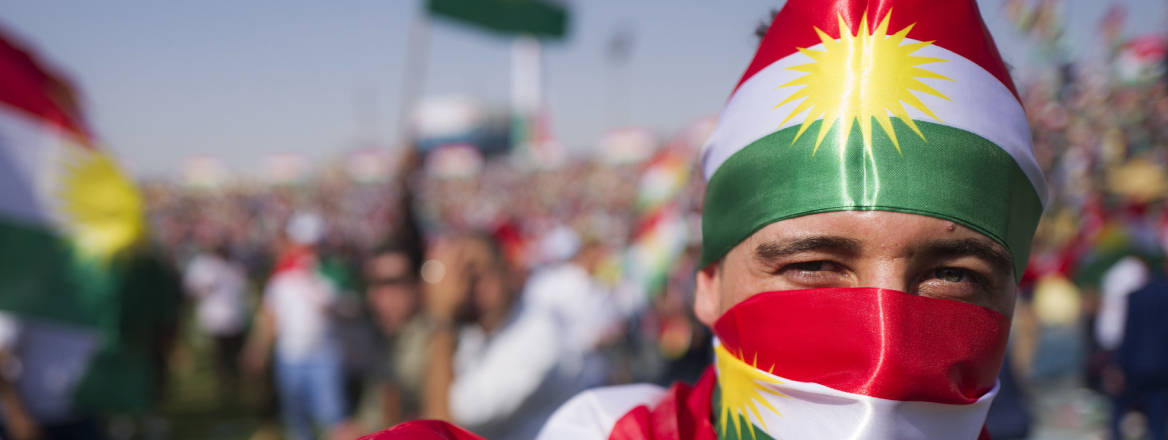Iraqi Kurds: A Referendum Which May Make History
Iraqi Kurds have voted in an independence referendum few in either the Middle East or the rest of the world thought wise. But that was the easy part – gaining independence will be much more difficult.
The referendum for the people of the Kurdistan Region of Iraq has taken place, and despite the emergence of a ‘No for Now’ campaign, the result is not in doubt.
The referendum could be a landmark turning point in the history of the Kurds, heralding the dawn of new boundaries in the region, generating the most seismic moment in the Middle East since the creation of Israel in 1948.
However, just as likely, the referendum could soon fizzle out, ending up as a footnote of history, and yet another failed attempt by the Kurds to assert their own political destiny.
That Kurds should want their own state is neither surprising, nor particularly controversial. The long and chequered history of British and French colonialism, which disenfranchised the Kurds’ national aspirations during the breakup of the Ottoman Empire in the 1920s, all but ensured they would be separated into four countries, forever an ethnic and linguistic minority deprived of control over their own affairs.
In a short time, the Kurdistan Region has become a regional actor in its own right, able to field a standing army, raise its own revenues and even conduct a broadly independent foreign policy
Since the fall of Iraqi leader Saddam Hussein in 2003, the rise to prominence of the semi-autonomous Kurdistan Regional Government (KRG) in Iraq has allowed the Kurds of Iraq to compensate, at least in part, for this situation.
In a short time, the Kurdistan Region has become a regional actor in its own right, able to field a standing army, raise its own revenues and even conduct a broadly independent foreign policy, much to chagrin of Baghdad. The past fourteen years have shown that the Kurds have managed to build a relatively secure island of stability in a tough neighbourhood.
Yet despite the wishes of the Kurds to be free, they still lack the requisite leverage to create the conditions to make that happen. Prisoners of geography, the landlocked Kurdistan Region relies on a combination of goodwill from its neighbours Iran and Turkey for trade and commerce, alongside extensive military support from the West, particularly the US, to secure itself from both internal and external threats.
The problem is that neither the neighbours, nor Western states are very much interested in facilitating any further upheaval in the Middle East at the moment. In the eyes of policymakers in Washington, and European capitals, Kurdish independence adds yet more fuel to a raging fire of regional instability and regional political violence.
For their part, neither Iran nor Turkey wishes to empower the Kurds at the expense of the current weakened state system in the region, or encourage separatist tendencies, which would potentially spread inside their own borders.
Both have mobilised aggressive rhetoric against the KRG, with the Iranians closing their airspace to planes leaving from Erbil and Sulaimaniyah International airports, and the Turks conducting military exercises close to the Iraqi border. Both have not ruled out military options and, although it is unlikely that these will be used, the risk of escalation remains great.
The Kurds have one main card to play, which is their value as allies in a region fighting global terrorist movements
Meanwhile, parliamentarians in Baghdad have voted to strangle the Kurdistan Region, closing all crossings and mobilising troops to the contest city of Kirkuk. Peshmerga forces have also been deployed into the city, and the possibility of conflict is very real.
The Kurds have one main card to play, which is their value as allies in a region fighting global terrorist movements. Finding themselves at the forefront of the battle against Daesh (also known as the Islamic State of Iraq and Syria, ISIS) since 2014, the Kurdish peshmerga has been seen as a strategic asset.
Kurds in both Syria and Iraq have been armed to the teeth with new weapons, while Western forces, have provided air cover and tactical support on the ground to push back Daesh forces. The relationship has been both a tactical and military success, but it is not without cost.
As Daesh begins to fade as a major actor in the region, the time to change the conversation from military to politics has come. But there is very little for the West to offer the Kurds in return for their role as military partners.
While predicting the policy of the US is risky under the current administration, there is little to suggest that President Donald Trump will deviate from Washington’s current policy, which is to recognise Baghdad as the official capital of Iraq, and to back its central government to the hilt.
Democratic Western states would hardly want to be seen as standing against the collective will of millions of people who had voted for separation from Iraq
This is difficult for the Kurds to accept, but they cannot do much about it, other than hope for a change of tune at some point in the future. Nevertheless, a successfully held referendum would place the US and other Western states in a tight spot.
Democratic Western states would hardly want to be seen as standing against the collective will of millions of people who had voted for separation from Iraq. But neither do they wish to be the main architects of a permanent rupture in a fragmented region.
The West will likely carve out an uncomfortable middle way; Western governments have denounced the referendum and will not recognise its results, but equally it is unlikely the West will stop the process of Kurdish separation from Iraq.
The hope in the West remains that a mutually agreed political process will mean that Baghdad and the Kurds do not opt for war. Whether this will be effective is a matter of debate, and the signs so far are that violence is likely to break out in areas disputed between Erbil and Baghdad.
In the back of Western minds will be one question. Does the referendum help or hinder efforts to fight terrorism? If it is the former, then an independent Republic of Kurdistan could well emerge within the next few years. If the latter, then Kurdistan may fight a long hard fight to be free.
The views expressed in this Commentary are the author’s, and do not reflect those of RUSI or any other institution.
WRITTEN BY
Michael Stephens
RUSI Senior Associate Fellow, RUSI International


